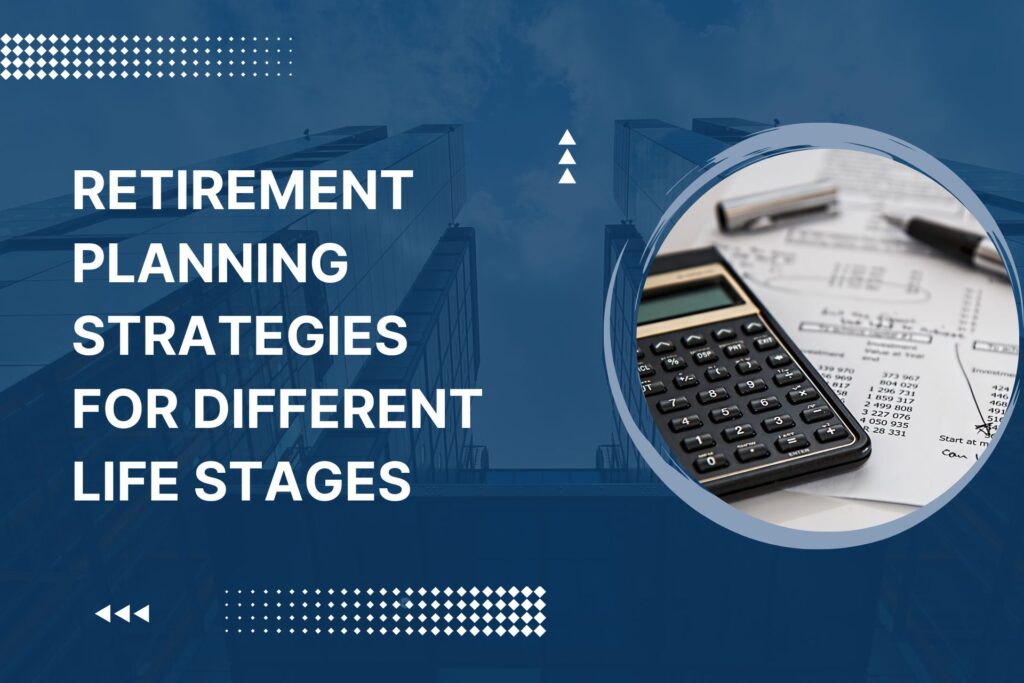Retirement planning is a crucial aspect of ensuring financial security and peace of mind in the future. It involves making strategic decisions and taking appropriate actions throughout different life stages to build a strong retirement fund. In this comprehensive guide, we will explore the importance of retirement planning and discuss strategies tailored to each stage of life. Whether you’re just starting your career, in the middle of it, nearing retirement, or already retired, this guide will provide valuable insights to help you secure your financial future.
Understanding the Importance of Retirement Planning
Retirement planning is the process of setting financial goals and making decisions that will enable you to live comfortably during your retirement years. It involves analyzing your current financial situation, estimating future expenses, and creating a savings plan to accumulate enough funds to sustain your desired lifestyle. The earlier you start planning, the more time you have to leverage the power of compounding and grow your retirement savings.
Early Career: Building a Strong Foundation for Retirement
Setting Financial Goals and Saving Strategies
During the early stages of your career, it’s essential to establish clear financial goals and saving strategies. Determine how much money you’ll need for retirement and break it down into smaller, manageable milestones. This approach allows you to track your progress and make adjustments along the way.
Taking Advantage of Employer-Sponsored Retirement Plans
Many employers offer retirement plans, such as 401(k)s or pension plans, which provide valuable benefits for employees. Take advantage of these plans by contributing regularly and maximizing any employer matching contributions. These contributions not only reduce your taxable income but also grow tax-deferred until withdrawal.
Managing Debt and Building an Emergency Fund
To strengthen your financial foundation, it’s crucial to manage debt effectively and build an emergency fund. Paying off high-interest debt early can save you money in the long run and free up more funds for retirement savings. Simultaneously, establishing an emergency fund ensures that unexpected expenses won’t derail your retirement plans.
Mid-Career: Accelerating Your Retirement Savings
Assessing Retirement Readiness
As you progress through your career, it becomes vital to assess your retirement readiness. Evaluate your current savings, projected retirement expenses, and potential income sources to determine if you’re on track. If necessary, adjust your savings rate or investment strategy to ensure you meet your goals.
Maximizing Retirement Contributions and Investment Options
During the mid-career stage, take advantage of higher income potential by maximizing your retirement contributions. Consider contributing the maximum allowed amount to retirement accounts and explore investment options that align with your risk tolerance and long-term goals. Diversification is key to managing risk effectively.
Balancing Retirement Savings with Other Financial Priorities
While saving for retirement is crucial, it’s also important to balance your retirement savings with other financial priorities. This may include saving for your children’s education, paying off mortgages, or addressing other long-term financial goals. A comprehensive financial plan can help you allocate funds wisely.
Pre-Retirement: Nearing the Finish Line
Evaluating Retirement Income Needs
As retirement approaches, it’s crucial to evaluate your anticipated retirement income needs. Consider factors such as lifestyle choices, healthcare expenses, and inflation. This assessment will help you determine if you’re on track to meet your income requirements and make any necessary adjustments.
Adjusting Investment Strategies for Less Risk
With retirement on the horizon, it’s prudent to adjust your investment strategies to reduce risk. Shift your portfolio towards more conservative investments to safeguard your savings against market volatility. Consult with a financial advisor to develop an investment plan that aligns with your risk tolerance and income needs.
Exploring Social Security and Medicare Considerations
Pre-retirement is the ideal time to familiarize yourself with Social Security and Medicare. Understand the eligibility requirements, benefit options, and potential impacts on your retirement income. This knowledge will enable you to make informed decisions when claiming benefits and planning for healthcare expenses.
Post-Retirement: Making Your Savings Last
Understanding Withdrawal Strategies and Tax Implications
Once you retire, managing your savings becomes crucial to ensure they last throughout your retirement years. Understand withdrawal strategies, such as the 4% rule, and the potential tax implications. Careful planning and working with a financial advisor can help optimize your withdrawals while minimizing tax burdens.
Health Care and Long-Term Care Planning
Healthcare expenses can significantly impact retirement finances. It’s essential to plan for health care and long-term care costs in advance. Evaluate insurance options, including Medicare and supplemental policies, to ensure adequate coverage and protection against unexpected medical expenses.
Legacy Planning and Estate Management
Legacy planning involves making decisions about how you want to distribute your assets and manage your estate. This includes creating wills, establishing trusts, and designating beneficiaries. Consulting with an estate planning attorney can help ensure your wishes are fulfilled and minimize potential complications for your loved ones.
The Role of a Financial Advisor in Retirement Planning
Benefits of Working with a Financial Advisor
Collaborating with a financial advisor can provide significant benefits during the retirement planning process. An experienced advisor can offer personalized guidance, help you navigate complex financial decisions, and provide objective advice based on your unique circumstances. They can also provide valuable insights into investment strategies and retirement income planning.
Finding the Right Advisor for Your Needs
When selecting a financial advisor, it’s essential to consider their qualifications, experience, and areas of expertise. Look for advisors who specialize in retirement planning and have a fiduciary duty to act in your best interest. Conduct interviews, review client testimonials, and seek recommendations to find the right advisor for your specific needs.
Collaborating with an Advisor Throughout the Different Life Stages
Retirement planning is an ongoing process that requires regular evaluation and adjustments. Collaborate with your financial advisor throughout different life stages to ensure your retirement plan remains aligned with your goals. Regular reviews and discussions can help address any changes in your financial situation, market conditions, or personal circumstances.
Choose Pension Deductions and embark on a journey towards a secure and fulfilling retirement. Contact us today to find the perfect pension planning consultant for your needs.
Conclusion: Securing Your Financial Future in Retirement
Retirement planning is a journey that spans various life stages. By understanding the importance of retirement planning and implementing the strategies discussed in this comprehensive guide, you can secure your financial future and enjoy a fulfilling retirement. Remember to start early, save consistently, leverage employer-sponsored retirement plans, and collaborate with a qualified financial advisor. With careful planning and disciplined execution, you can achieve financial security and peace of mind throughout your retirement years.


